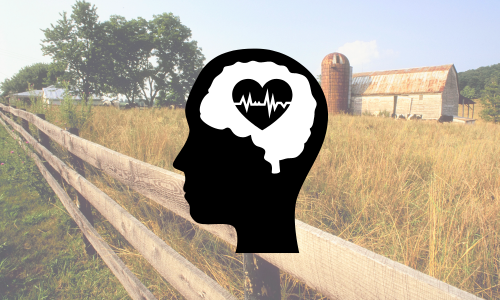Farming Is Tough, But So Are You
As we head into harvest time throughout the nation, now more than any other time of the year, it is evident that farming can be incredibly hard. The work can be hard, the lifestyle often times harder, and the pool of people who understand this continues to shrink. As an industry, we do not get the luxury of a “clock in and clock out” mindset. That is why most generations continue to love what they do; because farming is a lifestyle, not a job. This fact reveals some of the best qualities of a successful farmer, but it also creates some challenging moments.
Worldwide, stress is part of many of our daily lives. To our farming community, stress comes from factors such as unpredictable weather patterns, the current state of the commodity markets, global factors, financial pressures, and isolation. These stressors often lead to anxiety and depression, which can go unrecognized for long periods.
The agriculture industry is stoic, with its tough, resilient, “we can make it through” mentality. In rural areas, mental health tends to carry a stigma. It is a topic that many know is relevant, but can be extremely difficult to start a conversation about. This can result in it being difficult for someone in need to reach out or find the help needed. Mental health issues can impair different aspects of a farm’s operation, including decision-making, productivity, physical abilities, and management practices. With a farming lifestyle, the family members and communities of someone who may be struggling are affected during these tough times as well.
Collaboration and Communication
Living in rural America, many of the people you see throughout the day may not live on a farm or participate in day to day farm activities, but they live here. They see the tractors in the fields, they watch the semi being loaded, and many of them are probably related to someone who does farm or did many years ago. When the checkout lady at the grocery store asks how your day is, it is okay to tell her it has been a rough day because a cow went down and the corn markets are even lower than they were yesterday. It is important to say it out loud. Even though she may not know exactly what that means, vocalizing those words may lift even the tiniest bit of pressure from your shoulders.
Isolation can be a huge factor in the stressors of farming. Many farm families in today’s world have spouses with off the farm 9 am-5 pm jobs, to help provide income and benefits such as health insurance. If this is the case, you, as the farmer, may spend many hours with no social interaction. Even if there are several generations still contributing to the farm, much of the work is completed independently. It can also be difficult for some to get off the farm for social interaction, because of the unpredictability of a farming lifestyle.
As your Ag Banker, crop specialist, animal nutritionist, or even the neighbor that just swings by, we do not want to interrupt your operation. You have tasks to accomplish, and often times, in a timely matter. Take us along as you complete these tasks. Fill us in on what is happening on the farm, and maximize the social interaction. This contributes to improved mental health of both parties involved. Agriculture is a lifestyle, and even though the role looks a little different for those of us who hold titled positions within an organization, we live the lifestyle.
We encourage family, friends, and community members to encourage conversations, be an open ear, and find different ways to interact with your farmer friends. They may not be able to join you for an end of week drink at the local tap, because the weekend doesn’t mean their job is done, but they are more than likely always up for a warm plate delivered to the field.
To our communities’ farmers, we see you and we are here for you!


